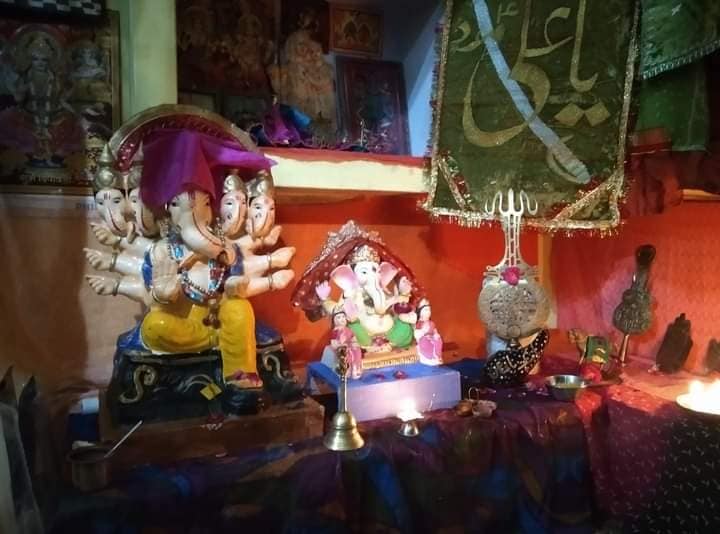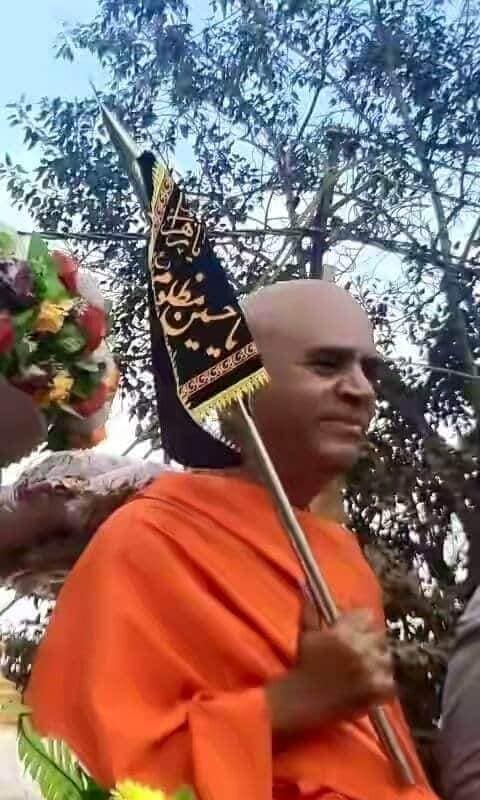
First published on 1st Sept 2020
Festivals do not jostle for the limelight in Jhansi, Uttar Pradesh and neither does religion. Every year, the city streets are interspersed with the merriment of Hindu processions and the Namaaz prayers read by their Muslim neighbours. Although festivals have been confined to indoor events due to the Covid-19 pandemic, the unity among the people of Jhansi has remained unchanged since colonial times.
According to Dharma Guru Pandit Hariom Pathak, Muslims in the city used to shower flowers at the Ganeshotsav processions passing by their houses until last year. Similarly, Hindus celebrate the Islamic tradition of Mourning in the month of Muharram by decorating ‘tazias’ in their houses.
“Our children have always been taught to observe equality as per the teachings of Rani Laxmibai. So, there is no question of any communal conflict,” he said.
By this, Pandit Pathak refers to the Bundelkhand history and legacy left behind by the late queen of Jhansi Laxmibai. Few people bother to remember that the iconic ‘Jhansi ki Rani’ was not only a revolutionary feminist warrior but also a leader who respected people from all religions and gave Muslims a place in her kingdom as well as in her army. In fact, she was an important ally of the Nawab of Banda Ali Bahadur. Thus, the people of Jhansi remember her by keeping any communal conflicts at bay.
According to the Principal of Madrsa Islamiya Jama Masjid Saraya Middle school Suhail Arshad, Hindus and Muslims have always celebrated each other’s festivals in Jhansi. During religious holidays, the Principal even welcomed curious children to learn about the different festivals celebrated in the city.
“It’s not just Muslims and Hindus. Every person from all religions lives together in harmony in Jhansi,” said Maulana Mohammad Hasheem Shaher Qazi of Imam Jama Masjid.
“We are Indians and shall remain so. We will always have our feeling of brotherhood, no matter what happens anywhere else,” he said, remembering the lack of enmity following the Babri Masjid incident.
Administrative officials proudly display the city and its secular lifestyle. Voicing the sentiments of Pandit Pathak, the Maulana said Jhansi owes it all to Queen Laxmibai and her secular reign.

“Every fire is started by a small spark. We never let that spark of hate burn here,” said Maulana Hasheem. He said that citizens here visited temples, masjids, churches, regardless of religion and supported if not celebrated each other’s faith. When asked whether the idol celebration such as Ganesh pooja poses a conflict considering the Islamic tenets against idol-worship, Maulana said, “This [celebration and respect of various faiths] is humanity. Humanity is above religion [dharma] because religion teaches us that humanity is within humans.”
Similarly, Shaher Qazi Mufti Sabir Qasmi said, “Humanity and dharma are like our two eyes. We cannot look at things using only one eye. We have to use both to understand our surroundings.”
While most people do not directly interact with the other community’s tradition, they try to support each other in every way they can. Even now, Muslims supported Hindus’ decision to worship small clay-idols of Lord Ganesha that were submerged in buckets meant to water plants. Other times, Muslims would put up water stalls and offer prasad (religious offerings) to those participating in the Hindus processions.
Unlike the rest of India, Jhansi is also free of discriminatory concepts such as ‘love jihad.’ Thus, although unusual, city-folks do not frown at inter-faith marriage. Laughing, the Mufti proclaimed that no one could oppose a consenting marriage. Moreover, they ensure that meat-shops remain closed during Hindu and Jain festivals out of mutual respect. People also make donations for festivals of other communities.
Over the years, many local newspapers and news portals have praised Jhansi and Bundelkhand area for the camaraderie with which Hindus and Muslims have celebrated each other’s festivals. During the peace committee meetings, people sit together before every event and have a lengthy discussion to avoid conflict.
“We sort of have a mixed culture of our own here. Not even corrupt politicians can create a rift among the people,” said Pandit Pathak.
The solidarity among the people is acknowledged by the police as well. Inspector Sunil Kumar of Barausagar police station said he has never seen any communal ill-will among people in the district. Last year, AltNews had detected a fake viral video that claimed communal violence in Barausagar, Jhansi. However, even such activities had failed to tear the social fabric of the city.
“Outsiders often come to our city with their own prejudices. Some have tried to create problems here but over the years, they learn to adapt to the city’s peace.” said Pandit Pathak. “You can try to break our peace but you can’t. We are a family that has grown up together.”
Maulana Hasheem once again assents to this claim and points out that regardless of festivals, religious leaders come together at least once every fortnight.
“I feel the entire country should be like this. Otherwise, all the fighting will kill all forms of celebration. Here we only know how to love, not hate,” said Maulana Hasheem.
Related:
Muslim leaders angry after MP government ignores Muslim freedom fighters in advertisements
In Tamil Nadu, Hindus observe ‘Allah Festival’ on eve of Muharram
